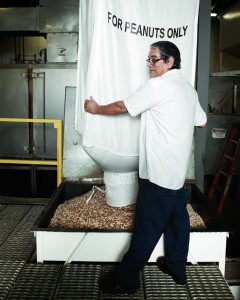Mark Hintlian, president of The Leavitt Corp., eats a peanut butter sandwich at his desk just about every day. Straight up—no jelly. It’s just one trademark of this modest man, who is proud to inhabit the office once occupied by his father, a space that is little changed since the elder Hintlian moved the company from Boston to Everett in 1960. Right down to the wood paneling that is evident in a photograph Hintlian proudly displays of the office when it belonged to his father, you wouldn’t guess these unassuming surroundings were home of the makers of Teddie Peanut Butter and River Queen mixed nuts—one of the 10 largest processors of nuts and peanut butter in the United States.
You might say Hintlian, who personally consumes a 16-ounce jar of Teddie Super Chunky every week, has peanut butter in his blood. His grandfather, Michael Hintlian, founded Leavitt Corp. in 1924. An Armenian immigrant, Michael started out working in his cousin’s candy business. Candy led to nuts, which led to peanut butter. It was a good business during the Great Depression, and it is a great business during the current economic downturn as well, Hintlian notes. “It is an inexpensive source of healthy, high-quality protein,” he says. While Hintlian doesn’t reveal sales figures, he says growth for the Teddie All-Natural brand is off the chart. It outsells Smucker’s Natural, the company’s biggest competitor, in the Northeast by a factor of five to one.
Hintlian credits his father, James Hintlian, with the company’s absolute dedication to modern manufacturing practices and strict quality controls. James, who graduated from Cornell with a degree in engineering, moved the business a bit to the north of Boston, settling in Everett in a brand-new factory in 1960. “In the post-[World War II] economy, he expected customers would demand quality,” Hintlian recalls, explaining the strict standards instituted by his dad.
James Hintlian’s focus on quality assurance and testing set the standard for Teddie and is perhaps a reason that the company has never experienced a recall. “He really set the tone,” Hintlian says of his father. “He was a visionary.” James still comes into the office one day a week, and he serves as chairman of the board. “He’s had his share of sleepless nights,” Hintlian says.
To ensure the highest food safety standards, the company participates in the Safe Quality Food (SQF) certification program. Recognized by the Global Food Safety Initiative, SQF is a comprehensive audit of processes from start to finish, ensuring the highest level of attention to safety and quality in food production. Leavitt consistently achieves the organization’s highest rating, and it’s not easy, notes Frederic Ricci, vice president of manufacturing compliance and HR. He gestures to a bookshelf full of binders tracking every step of their quality control process. “You have to live it and breathe it every hour,” he says. “You can’t just get ready a week before the audit begins.”
Because of Leavitt’s high food safety and quality ratings, some much larger manufacturers have flown in teams of executives to tour the Everett plant to pick up pointers. Ricci won’t name names, but he is clearly proud of that fact. “Little old Teddie is very progressive,” he says. “New food safety laws [that are being implemented in other companies] are what we already have in place.” The U.S. Food and Drug Administration is also impressed with Teddie. After the salmonella scare a few years back, the FDA sent five agents to scour the plant for seven days—taking swabs of every surface and peeking in every corner—and couldn’t find a single problem, Ricci recalls.
Ricci has been with the company for 35 years, but he’s no anomaly. Of the company’s 60 employees, more than half have been with the organization for 20-plus years. Ricci started out in the warehouse when he was in high school, putting peanut butter on pallets. “I’m lucky I enjoy coming to work,” he says. “A positive environment produces positive results.”
It’s clearly a positive environment at Teddie. As Hintlian walks the manufacturing floor, he greets every employee by name, and all of them are smiling as they oversee a process that starts with massive 2,200-pound bags of raw peanuts and ends with 4 million jars of Teddie Natural alone every year. Every jar consists of 850 peanuts, give or take a few.
One of seven children, Hintlian is the only one of his siblings involved in the business, and he knew from about age 11 that it was where he wanted to be. He started out loading and unloading trucks in the warehouse as a teenager. “There was no spring break for me,” he says, adding that his father told him to do well in math and English and to get a degree in business administration, which he did. After a stint at a leading food brokerage company, where he learned sales and marketing, he joined Teddie as a sales manager.
“My father told me, ‘People are counting on you to make the plant busy.’” Hintlian took that charge very seriously, and he is proud of the fact that Teddie is now the leading brand of natural peanut butter in the Northeast—without a dime spent on marketing.
In fact, the last time Teddie spent money on marketing was more than 30 years ago, when they were an official sponsor of “Boomtown,” a children’s TV show starring Rex Trailer that was produced in Boston from 1956 through 1974. These days, the company relies on word-of-mouth promotion. In fact, they were even late to the game on the Internet. It was only earlier this year that the company started beefing up its online presence and launched online ordering. That service has grown quite popular, and Teddie has already been shipped to places as far afield as Hawaii and Turkey.
Troops in Iraq and Afghanistan also enjoy Teddie. Leavitt donates product to local groups that ship to soldiers stationed overseas. Leavitt’s community involvement also encompasses the Greater Boston Food Bank, through which the company donates product and cash to support the organization’s work in feeding the hungry in the local area.

Of course, support of the community extends to employees. The company ensures good benefits and a fair wage for employees, Hintlian says, adding that “Everyone deserves to make a good living.” Those deep roots in the local community come with great responsibility, Ricci adds. “We’re committed to this area,” he says. “We’re proud of that local personal touch.”
Teddie is also proud of its devotion to using only U.S.-grown peanuts, primarily from Georgia, while other brands may import nuts from China and other places for their peanut butter. “There is nothing like the quality of the domestic USA crops, so why not support our local farmers?” Hintlian says. “They represent the best quality in the world market.” To that end, every jar of Teddie sports a red-white-and-blue logo from the American Peanut Council.
Hintlian is so committed to his product that his wife won’t visit the peanut butter aisle in the grocery store with him. She hides in another section as he peeks into people’s shopping carts and points out the pitfalls of other “natural” brands, including Skippy Natural, which, Hintlian explains, has so many ingredients it can’t be called peanut butter at all, but must instead be called peanut butter spread. While Teddie does produce a homogenized product, the real growth is in its natural peanut butter—the kind that needs to be stirred. The market for peanut butter in general is flat, but natural brands are seeing growth of 10 percent a year.
There’s no secret recipe to what goes inside every jar of Teddie Natural. It’s Hintlian’s grandfather’s original old-fashioned recipe—just peanuts and salt (there’s also an unsalted variety). The quality controls at each step of the way are what contribute to a taste that garners peanut butter devotees across the country and a high-quality product that was named best smooth peanut butter by Men’s Health magazine.
For starters, the company insists on only the best grades of nuts. “Distributors know we’re tough,” Hintlian says, adding that they will not bring anything less than top-quality nuts to the factory. “There are no compromises. It’s my family business.” Very little inventory is kept in the warehouse. Nuts are roasted and processed on the same day, mere steps apart, and the finished product is often on supermarket shelves in a matter of days. That yields a much fresher and safer product than some other brands, where the nuts may be roasted one day, then trucked to a different facility for processing. As Ricci notes, all that extra handling can lead to contamination of the product, because the roasting is the only step in making peanut butter that will kill salmonella.
Teddie Natural is also unusual in that it is one of the few peanut butters still sold in glass jars. Hintlian says the glass packaging appeals to the health-conscious consumer that is the company’s target audience, but more importantly, natural peanut butter is packaged at a pretty high temperature. “We have some concerns about the fill temperature and its effect on plastic,” Hintlian says.
Currently, Teddie distribution is concentrated in the Northeast, with New England, New York, and Pennsylvania making up the bulk of sales, but the brand is expanding into New Jersey and looking at other markets as well. While Hintlian says it would be nice to be a national brand one day, he’s in no hurry to get there. “It’s like taking steps up the stairs. Steps will allow us to maintain our commitment to quality. If we start running too fast and too hard, we could slip.”
THE PORTFOLIO
Chairman of the Board: James Hintlian
?President: Mark Hintlian
?Headquarters: Everett
Number of Employees: 60
Year Founded: 1924
Products: Teddie Old Fashioned Peanut Butter, available in smooth, super chunky, unsalted, unsalted super chunky, and with flax seed; Teddie All Natural Organic Peanut Butter, available in smooth and crunchy; Teddie Homogenized Peanut Butter; River Queen cashews, cashew halves, peanuts, pistachios, almonds, and mixed-nut items, available in salted, lightly salted, unsalted, and honey roast
Contact: 100 Santilli Highway, Everett; 617-389-2600; teddie.com

